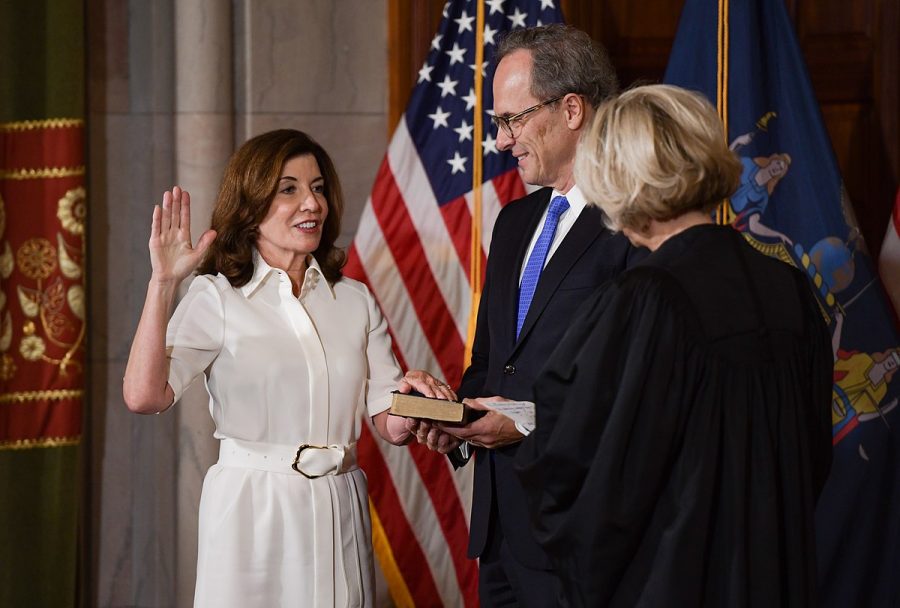Cuomo’s fall, Hochul’s rise: Sexual harassment scandal brings New York its first female governor
After corroborated sexual harassment allegations that led to Andrew Cuomo’s resignation, Kathy Hochul’s ascent to the governorship marks a new era for women in N.Y. state politics.
On August 24, Kathy Hochul was sworn in as New York’s first female governor after the resignation of Andrew Cuomo due to sexual harassment reports. Her governorship is historic for women in New York state politics. (Image via Wikimedia Commons)
September 2, 2021
Kathy Hochul, New York’s first female governor, was sworn in on Aug. 24. She succeeds fellow Democrat Andrew Cuomo, who resigned after a report by the state attorney general’s office corroborated sexual harassment allegations made against him.
Hochul’s governorship marks a new era for women in New York state politics. Presently, women comprise only 31% of the New York state legislature. New York has 19 female state senators, 48 female assembly members and 12 female city council members.
“Today, women still hold less than one-fifth of governorships in the United States,” Democratic New York state assemblymember Monica P. Wallace wrote in an email to WSN. “But I’m confident that Gov. Hochul will lead an effective and ethical executive branch, and in doing so, will open the door for more women to ascend to the highest offices of government.”
Nily Rozic — an NYU alum and a Democratic New York state assemblymember — said she believes Hochul’s leadership will shape the future of New York state politics.
“There is much to be said about doing more to elect women into higher office to bring about the change in government we so desperately need,” Rozic said. “However, I’m certain that Gov. Hochul will rise above and carry out her duties as New York’s first woman governor with the same conviction for progress and dedication to New Yorkers that has guided her years in public service.”
Although Hochul took office less than two weeks ago, she is under pressure to act quickly on New York’s COVID-19 response and move forward from the fallout of her predecessor’s resignation.
So far, the State of New York has agreed to pay the lawyers representing Cuomo in ongoing legal battles against his accusers as well as the lawyers hired by the state attorney general to investigate the allegations against him. Hochul, however, can decide if the state will continue to pay for lawyers to represent Cuomo and his administration.
“Incoming Governor Hochul will be faced with the aftermath of her predecessor’s accusations and, in turn, move forward with the important business at hand,” New York state assemblymember Inez E. Dickens wrote in an email.
Although Cuomo resigned, some New Yorkers do not believe that he was held responsible for his actions. Izzy Vieira, a CAS senior and president of The Politics Society at NYU, said that once elected officials such as Cuomo are held legally accountable for their actions, people tend to move on to another conversation or issue instead of advocating for more accountability.
“We’ll have to see if there’s actually any other legal accountability,” Vieira said. “The resignation is definitely impactful and it will definitely mean more if we see more legal action taken.”
Cuomo’s case has led some to believe that his resignation will not lead to increased accountability of elected officials.
“While Cuomo’s case certainly illustrates that lawmakers are not above the law and can be held accountable, his resignation and especially the way he failed to take responsibility for his own actions in his resignation speech — essentially weaponizing feminism for his own means, as he did repeatedly in the past — may impede full accountability down the line,” Elisa Wirsching, a Ph.D. student studying political accountability and bureaucratic politics, wrote in an email to WSN.
Cuomo has portrayed himself as a champion of women’s rights, publicly pushing for legislation to protect reproductive rights and combat sexual harassment in the workplace. This has made the resignation and allegations especially significant, according to Wirsching.
“Cuomo has long campaigned on women’s rights and portrayed himself as a champion of gender equality, using the rhetoric of feminism and publicly supporting the #MeToo movement,” Wirsching said. “The fact that he pressed for laws around sexual harassment while privately acting against these laws may have contributed to the significant amount of pressure on Cuomo to resign.”
While some elected officials have been held accountable for sexual assault and harassment, Vieira contended that the news around #MeToo was heavily focused on Hollywood executives, such as Harvey Weinstein. Since Cuomo has become a national figure, Vieira added that his resignation is a reminder that elected officials can and should be held accountable for their wrongdoings.
“I feel like there are just so many things about politicians that happen and they are rarely held accountable,” Vieira said. “I’m 100% certain that other politicians have done probably the same or worse shit. At the federal level, there has been a lot of stuff that comes out [regarding sexual misconduct] that kind of just goes under the radar.”
Wirsching believes that while Cuomo’s resignation and his replacement by Hochul is a moment of hope for New Yorkers, they should think critically about the context of this moment.
“While scandals like these provide a window of opportunity to change the composition of public management, it is also problematic from an accountability and representation perspective if women primarily gain positions of power when men fail and are ousted in scandals,” Wirsching said.
Contact Gianna Jirak and Rachel Fadem at [email protected].

























































































































































